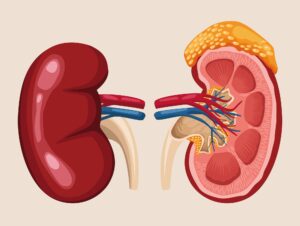Introduction
When it comes to health, young individuals often feel invincible, assuming that major organ issues only affect older adults. However, kidney problems can affect anyone, regardless of age. In this blog post, we’ll explore essential information about kidney health, the signs of potential problems, and proactive steps that young people can take to maintain optimal kidney function.
Understanding the Basics
The Role of Kidneys:
The kidneys serve as vital organs with multifaceted functions, playing a pivotal role in maintaining overall health. Their primary responsibilities include filtering waste products and excess fluids from the blood, a crucial process that ensures the elimination of toxins. Additionally, the kidneys play a pivotal role in urine production, facilitating the removal of waste from the body. They contribute significantly to the regulation of electrolyte balance, ensuring the proper concentration of essential minerals in the bloodstream. Moreover, the kidneys are integral to blood pressure control, as they influence blood volume and the constriction or dilation of blood vessels.
Common Kidney Conditions:

Chronic Kidney Disease (CKD)
-
- Definition: CKD is a long-term condition characterized by the gradual loss of kidney function over time. It is often categorized into five stages based on the estimated glomerular filtration rate (eGFR), which measures the kidneys’ ability to filter waste and excess fluids from the blood.
- Causes: Several factors contribute to CKD, including:
- Diabetes: High blood sugar levels can damage blood vessels in the kidneys.
- Hypertension (High Blood Pressure): Elevated pressure can strain the kidneys over time.
- Genetic Factors: Some individuals may be genetically predisposed to kidney conditions.
- Symptoms: In the early stages, CKD may be asymptomatic. As the disease progresses, symptoms may include fatigue, swelling, changes in urination patterns, and difficulty concentrating.
- Diagnosis: Blood tests to measure creatinine and eGFR, urine tests, and imaging studies are commonly used to diagnose CKD.
- Treatment: Management involves addressing the underlying causes, lifestyle modifications (such as dietary changes and exercise), and medications to control blood pressure and manage symptoms. In advanced stages, dialysis or kidney transplantation may be necessary.
Kidney Stones
-
- Formation: Kidney stones develop when minerals and salts in the urine crystallize and form solid deposits. The stones can vary in size, from tiny particles to larger, more obstructive formations.
- Causes: Dehydration, dietary factors (such as high intake of oxalate-rich foods), and certain medical conditions (like hyperparathyroidism) can contribute to stone formation.
- Symptoms: The movement of kidney stones through the urinary tract can cause severe pain, often referred to as renal colic. Other symptoms include blood in the urine, nausea, and frequent urination.
- Diagnosis: Imaging studies (ultrasound, CT scans) help confirm the presence and location of kidney stones.
- Treatment: Small stones may pass on their own with increased fluid intake. Pain management and medications to relax the ureter may be prescribed. Larger stones may require procedures like lithotripsy (breaking the stones using sound waves) or surgical removal.
Urinary Tract Infections (UTIs)
-
- Definition: UTIs can affect various parts of the urinary system, including the bladder, urethra, and kidneys.
- Causes: Bacteria, often Escherichia coli (E. coli), entering the urinary tract is the primary cause of UTIs. Factors such as sexual activity, urinary tract abnormalities, and weakened immune systems can contribute.
- Symptoms: Symptoms include pain or a burning sensation during urination, frequent urination, cloudy or foul-smelling urine, and lower abdominal discomfort.
- Complications: If left untreated, a UTI can ascend to the kidneys, leading to a more severe condition known as pyelonephritis, which can cause fever, back pain, and potential kidney damage.
- Diagnosis: A urine culture is commonly performed to identify the causative bacteria, and imaging studies may be conducted to assess kidney involvement.
- Treatment: Antibiotics are prescribed to eliminate the bacterial infection. Adequate hydration and measures to prevent recurrent UTIs may also be recommended.
Signs of Kidney Problems

-
Changes in Urination:
- Frequency: Increased or decreased frequency of urination can be a sign of kidney problems. Changes in the kidneys’ ability to regulate fluid balance may lead to more or less urine production.
- Color and Odor: Unusual changes in the color or odor of urine may indicate the presence of substances that the kidneys normally filter out. For example, dark, foamy, or foul-smelling urine could be a cause for concern.
- Pain or Discomfort: Pain or discomfort during urination, known as dysuria, may suggest a urinary tract infection or kidney stones. It’s important to note any sharp or persistent pain and report it to a healthcare professional.
-
Swelling and Fluid Retention (Edema):
- Location: Kidney problems can lead to the accumulation of fluids in the body, causing swelling, particularly in the ankles, legs, and face.
- Mechanism: The kidneys are responsible for regulating the body’s fluid balance. If they are unable to remove excess fluids effectively, edema can occur. This may be visible as puffiness or swelling in the affected areas.
-
Fatigue and Weakness:
- Buildup of Waste Products: Kidney dysfunction can result in the inadequate removal of waste products from the blood. The buildup of toxins can contribute to feelings of fatigue and weakness.
- Anemia: Kidneys also play a role in the production of red blood cells. Anemia, characterized by a decrease in red blood cell count, can occur in advanced kidney disease, leading to tiredness and weakness.
-
High Blood Pressure (Hypertension):
- Regulation of Blood Pressure: The kidneys play a vital role in regulating blood pressure by controlling fluid balance and releasing hormones. Kidney problems can disrupt this balance, contributing to hypertension.
- Monitoring: Regular monitoring of blood pressure is crucial, as persistent high blood pressure may be an early sign of kidney dysfunction.
-
Persistent Back Pain:
- Location: Discomfort or pain in the kidney area, typically felt in the lower back on one or both sides, may indicate kidney problems.
- Causes: Kidney pain can be a result of conditions such as kidney stones, infections, or inflammation. Persistent or severe back pain, especially when accompanied by other symptoms like changes in urination or swelling, should prompt a medical evaluation.
Recognizing these signs is essential for early detection and intervention in potential kidney problems. If you experience any of these symptoms, it is advisable to consult with a healthcare provider for a thorough examination, diagnosis, and appropriate management to maintain kidney health. Regular check-ups and monitoring of your overall well-being can contribute to the timely identification and treatment of kidney-related issues.
Proactive Steps for Kidney Health
-
Stay Hydrated:
- Importance of Hydration: Adequate water intake is essential for maintaining healthy kidneys. Water helps in flushing out toxins and waste products from the body through urine, supporting optimal kidney function.
- Daily Intake: Aim to drink at least eight glasses (about 2 liters) of water per day. The actual water needs may vary based on factors such as age, climate, and physical activity level.
-
Maintain a Healthy Diet:
- Balanced Nutrition: Adopt a well-rounded and nutritious diet that includes a variety of fruits, vegetables, whole grains, and lean proteins. These foods provide essential nutrients, vitamins, minerals, and antioxidants that support overall health, including kidney function.
- Limit Sodium Intake: Excessive sodium intake can contribute to high blood pressure, which is a risk factor for kidney problems. Avoiding processed foods and limiting salt intake is crucial for kidney health.
-
Regular Exercise:
- Cardiovascular Health: Engage in regular physical activity to support cardiovascular health, which is directly linked to kidney health. Exercise promotes better blood circulation and helps in maintaining a healthy weight.
- Moderation is Key: While regular exercise is beneficial, it’s important to avoid excessive or strenuous activities, especially if there are pre-existing health conditions. Consult with a healthcare professional before starting a new exercise routine.
-
Avoid Overuse of Over-the-Counter Painkillers:
- Concerns with Painkillers: Certain over-the-counter pain medications, such as nonsteroidal anti-inflammatory drugs (NSAIDs), can cause kidney damage if used excessively or over a prolonged period. Consult with a healthcare professional before using these medications regularly, especially if there are concerns about kidney health.
-
Regular Health Check-ups:
- Blood Pressure Monitoring: Regularly monitor blood pressure, as hypertension is a significant risk factor for kidney problems. Routine checks allow for early detection of elevated blood pressure and prompt intervention.
- Kidney Function Tests: Include kidney function tests in regular health check-ups. These tests may include blood tests to measure creatinine and glomerular filtration rate (GFR) to assess the kidneys’ filtering capability.
- Early Intervention: Early detection of any potential kidney issues allows for timely intervention and management, potentially preventing the progression of kidney disease.
Incorporating these proactive steps into your lifestyle can contribute significantly to the health and proper functioning of your kidneys. By adopting healthy habits and being mindful of potential risks, you can play an active role in preventing kidney problems and promoting your overall health.
Conclusion
Taking care of your kidneys is a crucial aspect of overall health. By understanding the basics, recognizing potential signs of kidney problems, and adopting proactive lifestyle habits, young individuals can play an active role in maintaining optimal kidney health. Don’t wait until symptoms arise—prioritize your kidney health now for a healthier future. If you experience any concerning symptoms, consult with a healthcare professional promptly.


